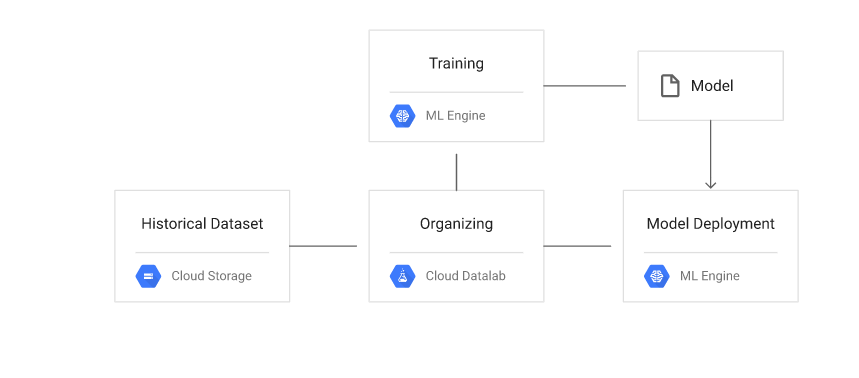Building and Deploying ML Models On The Google Cloud
Posted By : Anirudh Bhardwaj | 27-May-2020

Building and deploying machine learning models as web services can be tricky, not to mention the exorbitant costs involved in maintaining the architecture. Using Google Cloud, however, can significantly reduce the complexities by providing a simple, intuitive, and serverless approach to building and deploying machine learning models.
We, at Oodles Technologies, specialize in building and deploying machine learning models on various cloud platforms like AWS, Azure, and GCP. We have successfully completed several cloud-based AI projects for clients from across the globe. Based on our experience in cloud app development, we walk you through the process of deploying ML models on the cloud.
Let’s explore how we can build a custom machine learning (ML) model on Google Cloud Platform (GCP). Then we’ll discuss the significance of deploying ML models on the Google cloud and the main benefits of implementing them.
Also read Accelerating Data Analytics Using Google BigQuery
Getting Started
To successfully build and deploy machine learning models, developers require a clear roadmap and dedicated tools at every stage of development. Furthermore, it is to ensure a seamless integration of the basic units of the ML functionality that we are going to implement. Negligence of these steps may lead to the development of a model that would have higher latency and lower performance efficiency.
To ensure a smooth integration of system units, we must have a neatly defined architecture that clearly delineates each system component. Given below is a basic architecture diagram that illustrates the development and deployment of ML models.

Image source: Google Cloud (GCP)
The Development Roadmap
Google Cloud Platform (GCP) provides two easy ways to develop machine learning models.
- Using prebuilt RESTful Perception APIs
Developers can use Google’s prebuilt and pre-trained APIs including the Cloud Vision API and the Cloud Speech API for implementing ML functionalities. For example, you can use these APIs to implement advanced functionalities such as Sentiment Analysis and Auto-tagging.
- Build and reuse ML models
Developers can either build new ML models from scratch or reuse the existing ones, training them using tools like TensorFlow and Keras. This approach is best suited for accurately predicting the resolution time and priority.
Deploying ML Models On Google Cloud Platform
Google Cloud Platform is extensively used for the cloud deployment of machine learning models. It is a popular choice amongst other cloud computing platforms including Azure and Amazon Web Services (AWS). With GCP, you get three different options for implementing machine learning models i.e using Google App Engine, Google AI Platform, or Google Cloud Function. Let’s discuss these in detail.
- Google App Engine
Google App Engine is a cloud-based platform as a service that lets you develop and host web applications. Developers can use its auto-scaling feature to automatically allocate additional resources for the web application. Above all, it combines infrastructure as a service (IaaS), platform as a service (PaaS), and software as a service (SaaS) to provide a holistic cloud deployment environment for ML models.
- Google AI Platform
The AI platform enables developers, data scientists, and data engineers to effortlessly deploy ML models for their varied project requirements. With Google AI platform, developers do not require any additional tools to develop and deploy machine learning models.
- Google Cloud Function
Google Cloud Function is an event-driven serverless computing platform that automatically executes the given function as and when required. With this, you do not need to set up or incorporate server provisioning and other related computing resources. Some unique benefits of using Cloud Function include automatic scaling, integrated monitoring, distributed tracing, and built-in security. Alternatively, you can use other cloud tools like AWS Lambda and Azure Functions to avail the same benefits.
You may also be interested in reading Building and Deploying Java Microservices On The Cloud
Wrapping Up
Once the model is deployed, it is accessible through a RESTful API which makes it available to all types of clients. The deployed ML model is available for both online and offline prediction. Further, it is recommended to store and query data using Google BigQuery, a columnar database for big data analytics. BigQuery lets you process enormous data (in terabytes and petabytes) within seconds.
Why Choose Oodles Technologies For Cloud Application Development?
We are a seasoned cloud app development company that provides end-to-end cloud computing services to clients. Our development team is skilled at using the popular cloud technologies like AWS, Azure, and Google Cloud Platform (GCP) to build, deploy and scale high-quality enterprise applications. We provide full-scale cloud integration and migration services to facilitate increased security, scalability, accessibility, and interoperability. Our end-to-end cloud application development services enhance enterprise benefits, render transparency, and performance efficiency.
Cookies are important to the proper functioning of a site. To improve your experience, we use cookies to remember log-in details and provide secure log-in, collect statistics to optimize site functionality, and deliver content tailored to your interests. Click Agree and Proceed to accept cookies and go directly to the site or click on View Cookie Settings to see detailed descriptions of the types of cookies and choose whether to accept certain cookies while on the site.










About Author
Anirudh Bhardwaj
Anirudh is a Content Strategist and Marketing Specialist who possess strong analytical skills and problem solving capabilities to tackle complex project tasks. Having considerable experience in the technology industry, he produces and proofreads insightful content on next-gen technologies like AI, blockchain, ERP, big data, IoT, and immersive AR/VR technologies. In addition to formulating content strategies for successful project execution, he has got ample experience in handling WordPress/PHP-based projects (delivering from scratch with UI/UX design, content, SEO, and quality assurance). Anirudh is proficient at using popular website tools like GTmetrix, Pagespeed Insights, ahrefs, GA3/GA4, Google Search Console, ChatGPT, Jira, Trello, Postman (API testing), and many more. Talking about the professional experience, he has worked on a range of projects including Wethio Blockchain, BlocEdu, NowCast, IT Savanna, Canine Concepts UK, and more.